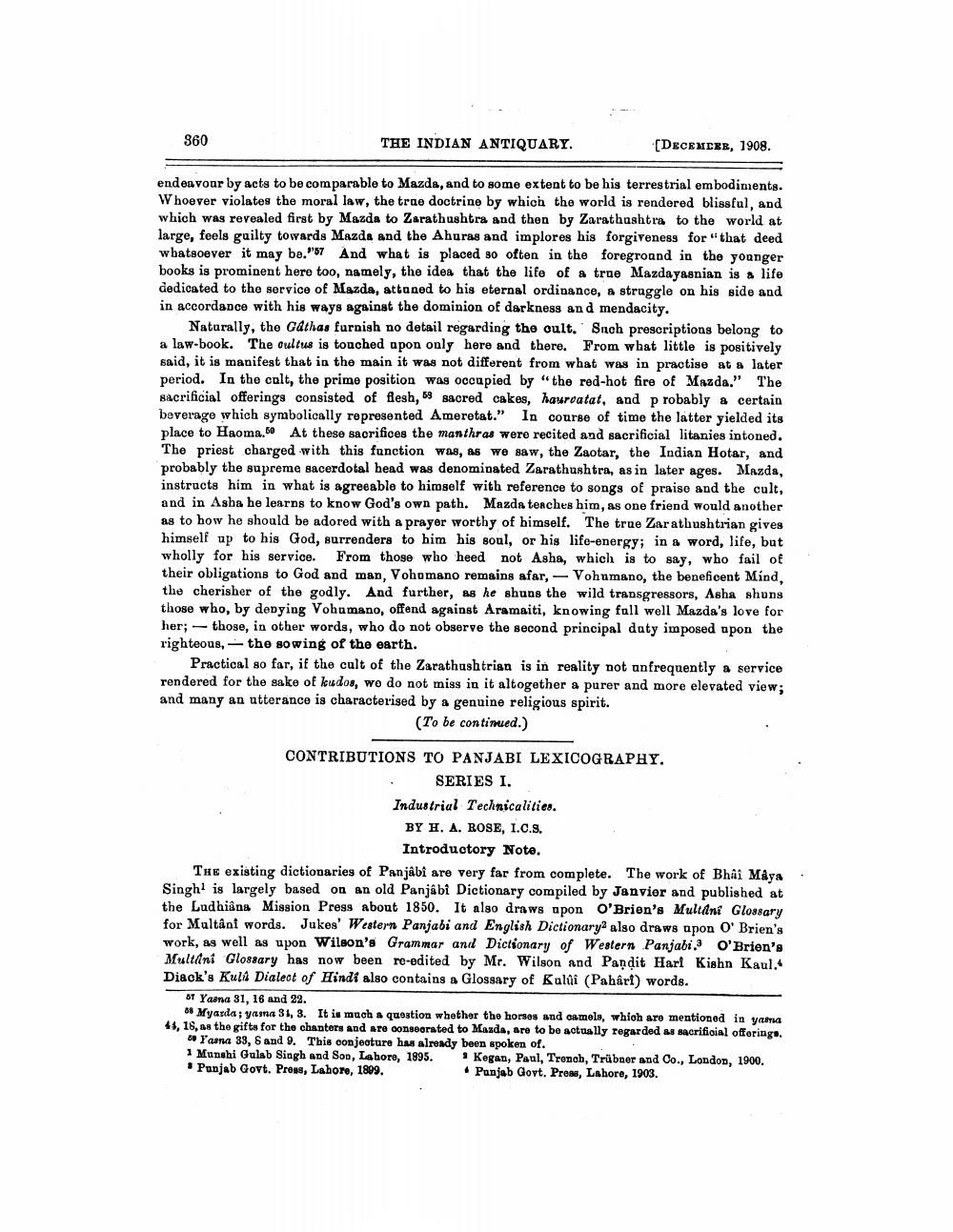________________
360
THE INDIAN ANTIQUARY.
[DECEMCER, 1908.
endeavoar by acts to be comparable to Mazda, and to some extent to be his terrestrial embodiments. Whoever violates the moral law, the trae doctrine by which the world is rendered blissful, and which was revealed first by Mazda to Zarathushtra and then by Zarathashtra to the world at large, feels guilty towards Mazda and the Ahuras and implores his forgiveness for that deed whatsoever it may be."57 And what is placed so often in the foreground in the younger books is prominent here too, namely, the idea that the life of a true Mazdayasnian is a life dedicated to the service of Mazda, attoned to his eternal ordinance, & struggle on his side and in accordance with his ways against the dominion of darkness and mendacity.
Naturally, the Gathas furnish no detail regarding the oult. Sneh prescriptions belong to a law-book. The cultus is touched apon only here and there. From what little is positively said, it is manifest that in the main it was not different from what was in practise at a later period. In the cult, the prime position was occupied by “the red-hot fire of Mazda.” The sacrificial offerings consisted of flesh, 69 sacred cakes, haurdatat, and probably a certain beverage which symbolically represented Ameretat.” In course of time the latter yielded its place to Haoma. At these sacrifices the manthras were recited and sacrificial litanies intoned. The priest charged with this function was, as we saw, the Zaotar, the Indian Hotar, and probably the supreme sacerdotal head was denominated Zarathushtra, as in later ages. Mazda, instructs him in what is agreeable to himself with reference to songs of praise and the cult, and in Asba he learns to know God's own path. Mazda teaches him, as one friend would another as to how he should be adored with a prayer worthy of himself. The true Zarathushtrian gives himself up to his God, surrenders to him his soul, or his life-energy; in a word, life, but wholly for his service. From those who heed not Asha, which is to say, who fail of their obligations to God and man, Vohomano remains afar, - Vohumano, the beneficent Mind, the cherisher of the godly. And further, as he shuns the wild transgressors, Asha shuns those who, by denying Vohumano, offend against Aramaiti, knowing full well Mazda's love for her; - those, in other words, who do not observe the second principal daty imposed upon the righteous, the sowing of the earth.
Practical so far, if the cult of the Zarathushtrian is in reality not anfrequently a service rendered for the sake of kudos, we do not miss in it altogether a purer and more elevated view; and many an utterance is characterised by a genuine religious spirit.
(To be continued.)
CONTRIBUTIONS TO PANJABI LEXICOGRAPHY.
SERIES I. Industrial Technicalities.
BY H. A. ROSE, I.C.S.
Introductory Note. The existing dictionaries of Panjabi are very far from complete. The work of Bhai Maya Singh is largely based on an old Panjabi Dictionary compiled by Janvier and published at the Ludhians Mission Press about 1850. It also draws upon O'Brien's Mulini Glossary for Multant words. Jukes' Western Panjabi and English Dictionary also draws upon O'Brien's work, as well as upon Wilson's Grammar and Dictionary of Western Panjabi. O'Brien's Multani Glossary has now been re-edited by Mr. Wilson and Pandit Hari Kishn Kaul. Diack's Kula Dialect of Hindi also contains a Glossary of Kalui (Pahari) words.
T Yaana 31, 16 and 22.
* Myarda, yama 31, 3. It is much a question whether the horses and onmols, which are mentioned in yama 45, 16, as the gifts for the chanters and are consecrated to Mazda, are to be actually regarded as sacrificial offerings
0 Yanna 33, 6 and 9. This conjecture has already been spoken of. 1 Munshi Gulab Singh and Son, Laboro, 1895. Kegan, Paul, Tronch, Trübner and Co., London, 1900. • Punjab Govt. Press, Labore, 1899.
• Punjab Govt. Press, Lahore, 1903.




